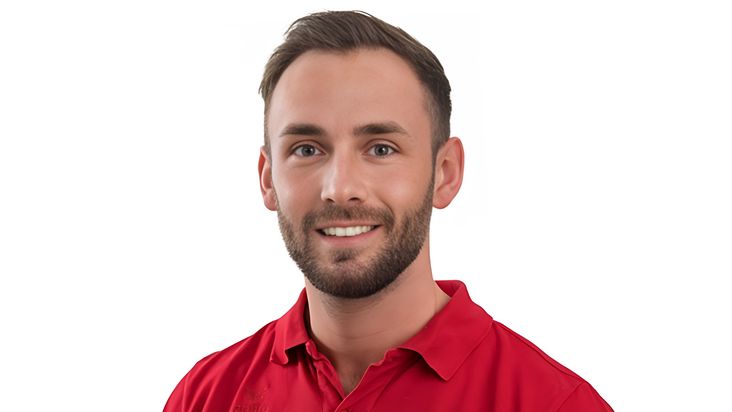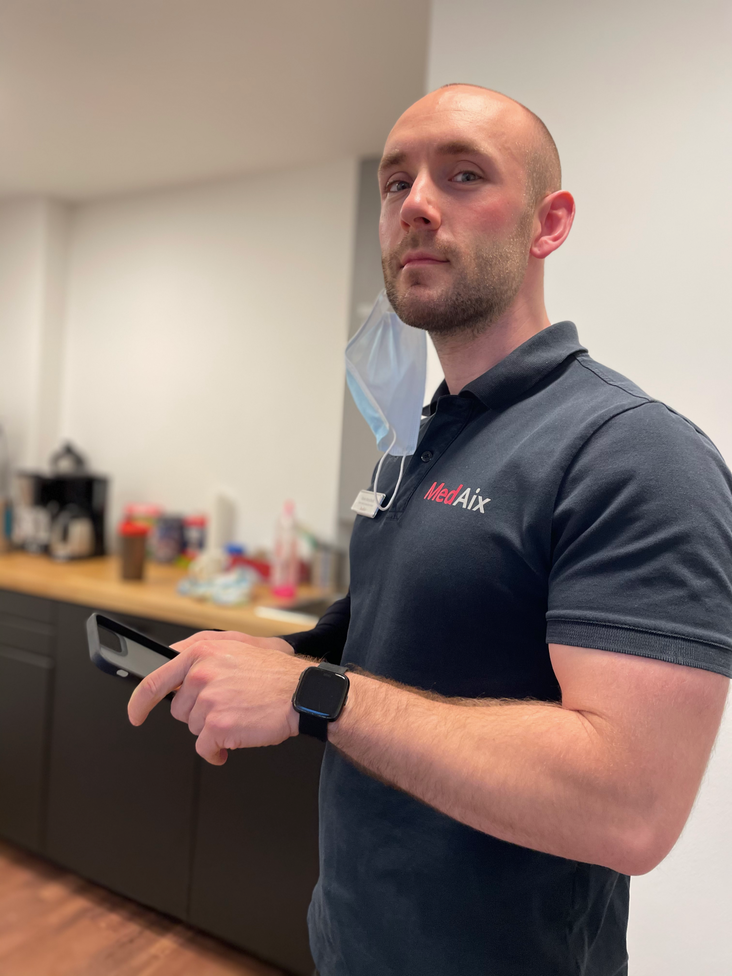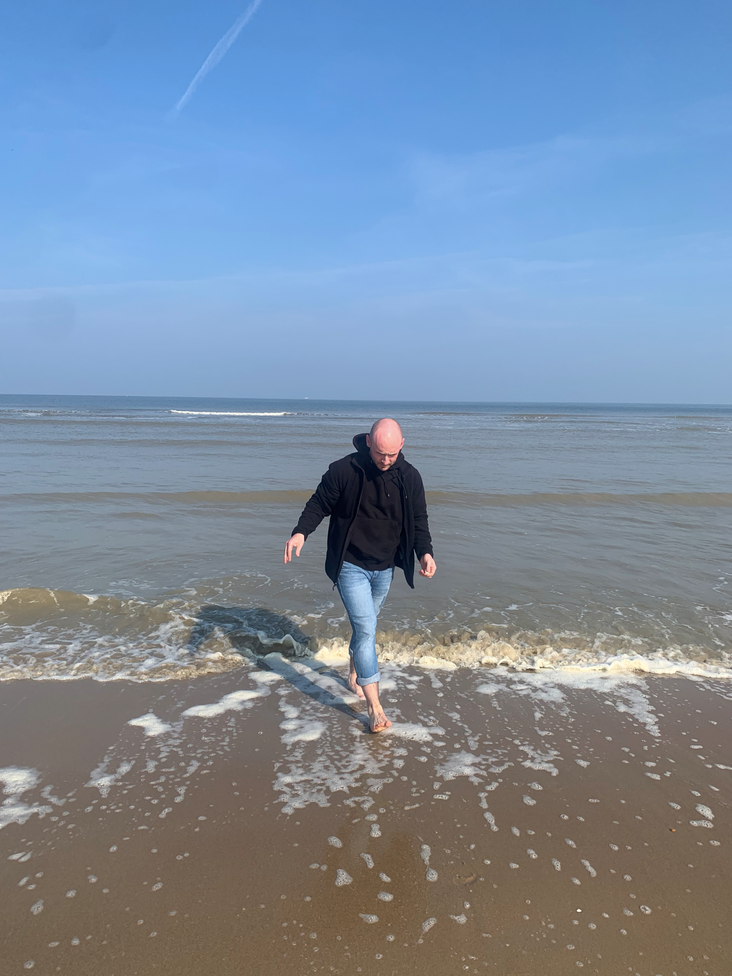Expert Advice: Promoting Health and Focus Through Exercise
Oct 24, 2023 by Vreny Blanco · 11 min read · Interviews, Wellness

Welcome to another edition of our Ask the Expert article series on the 1Focus Blog. Today, I am pleased to introduce you to the remarkable sports and health trainer Kevin Harscheidt. Kevin has a wonderful way of using his upbeat personality and positive energy to motivate others to achieve their health goals.
In this interview, you will learn Kevin’s tips for improving physical fitness, overall health, focus, and concentration. He also shares some insights into how he faces and overcomes challenges.
Let’s dive in!
Tell us something about yourself.
Hi, I’m Kevin, 32 years old, and I live in Aachen, Germany. I’m a sports and health trainer and deputy operations manager at MedAix Training GmbH, located in Elisengalerie, Aachen, Germany.
When did you start your fitness journey?
I’ve been doing sports for as long as I can remember, mainly soccer in the beginning. Later, it developed in other directions. I’ve been working out or doing weight training since I was 16. It started in my dad’s basement with a few weights and a bench, and I’ve been a gym member ever since I turned 18 and could drive by myself.
I’ve always had an interest in other sports, but my undying love for exercise is focused on running and health-oriented strength training. I had to give up football about 8 years ago because of work.
How long have you been working as a sports and health trainer?
I’ve been working in this field since 2015, at that time as a complete career changer at the age of 23. After graduating from high school, the dashed “dream” of joining the police (one eye was too weak in terms of eyesight) and the failed aptitude test at the Spoho (Sports University of Cologne, at that time I had an injured shoulder that could not bear weight for months), life finally led me to MedAix Training GmbH in 2017 via vocational training in the trades (2010-2013) and other detours.
What motivated you to work in this field?
My motivation at the time was actually “to do what I love and to help other people” – as romantic and cheesy as that sounds. The motivation for the career change at that time also stemmed, among other things, from my odyssey with my shoulder injury, which I ultimately rehabilitated myself.
Although priorities have shifted with age, the urge to share my knowledge with eager people and to always learn from others is more relevant than ever!
What helps you focus and be productive?
As simple and mundane as it sounds, my core mantra is: “Just do it!” – Nothing has shaped me as much as this attitude, which is ultimately based on years of experience and the self-confidence I have gained through numerous failures and difficult (life) situations.
I can accomplish anything, somehow – and if I don’t know how, I learn it. You usually only learn sustainably by trying and making mistakes; at least, that’s the case for me. My drive is the will to accomplish and achieve things, to rediscover myself, to develop further, and to create my best possible self-version. You can only achieve that through experience.
I am definitely most focused with music. It helps me to isolate myself and get into the “tunnel”!
My drive is the will to accomplish and achieve things, to rediscover myself, to develop further, and to create my best possible self-version.
How do you avoid distractions?
I like to work alone and in a clear working environment (working from home would be almost impossible for me!). If I’m not alone in the office, I definitely need my headphones.
Once I’m in my own world, I can accomplish a lot, very well, and in a short amount of time!
How do you manage to work when you are unmotivated?
Just do it! ;-)
If I don’t do it, nobody will. At least, that’s what I’ve experienced for years, and it has strongly imprinted itself on my personality. So “just do it” because the tasks won’t disappear on their own. If I have “better” things to do and can easily postpone a task, I also like to do that. Ultimately, this is what keeps the overall motivation at its best: the optimal, alternating prioritization of work and pleasure in a balanced measure.
This is what keeps the overall motivation at its best: the optimal, alternating prioritization of work and pleasure in a balanced measure.
How does nutrition affect athletic performance and concentration?
Objectively, it has a tremendous influence. Subjectively, it is even everything.
Evidence-based, I know how important nutrition is (without wanting to go into more detail, that would get out of hand!). To me, however, nutrition is essential. I spend most of my salary on high-quality food – and I don’t mean restaurant visits. Equally important is to enjoy and eat things that I just like, without having to be healthy – if you do a lot of sports, your body will forgive you a lot. O:-)
Ultimately, the dose makes the poison (like almost everything). Be active and eat primarily balanced, protein-rich and as “colorful” as possible in fruits and vegetables. That’s all. Keep a rough eye on the calorie balance in the long term, and that’s it. That’s my “secret recipe.”
To implement this requires much more routine than discipline, whereby the one conditions the other. So I eat and drink almost identically in the morning and have a choice of meals and snacks that I juggle with every day. Exceptions then prove the rule.

Are there recommendations for planning meals before, during, or after training?
It is super individual.
Everyone should test this for themselves; there is no good general statement. From my experience, no or, at most, light food directly before training and not necessarily eating something directly afterward. In the end, meal timing depends on several factors, such as the daily schedule. That’s what makes it so individual.
Eating the main meals with calm and thoughtfulness, enjoying them and preparing them as completely as possible by yourself would be my general advice, as it also grounds you at the same time. :-)
Are there certain foods or nutrients that can promote concentration and performance?
Especially amino acids! Proteins. Feel free to google the word meaning/origin of “protein”. ;-)
If you pay attention to a high protein intake (at least 1.5 g protein per kilogram of body weight per day) without dietary supplements, most of the necessary nutrients are automatically included. This is not meant to refer to veganism, without wanting to elaborate on that point. From here on, it would become very complex if I wanted to do justice to all beliefs or relativize everything appropriately.
How are sports and concentration related?
Both are closely connected.
We are made for movement; this factor should never be neglected. To put it briefly, I would like to quote Juvenal here: “Mens sana in corpore sano” (“A healthy mind in a healthy body”).
However, the mix is also crucial here! Wearing yourself out is bad for concentration, but so is being under-challenged. The key factor in this regard is regeneration, e.g., sleep – often completely underestimated (more on that later).
What role does hydration play in maintaining concentration and energy during exercise?
An important and often underestimated role. We consist of at least about 50% water. Water is essential for us humans. And with increased exertion, we lose a lot of water when breathing and, of course, when sweating.
It doesn’t necessarily have to be an isotonic drink; the main thing is fluid and ideally low in calories.

How do sleep and recovery affect fitness and concentration?
I’ve already touched on this topic. Sleep is essential; sleep is regeneration.
At least 7 hours per night (preferably 8-9 upwards) and a power nap at noon/afternoon. It is absolutely recommended. I don’t manage it every day, but as often as possible, I lie down for at least 10 minutes; up to 30 minutes would be a dream. Easier said than done.
Such a nap has to be learned; it’s not known (anymore), and it often doesn’t work at the beginning. But you can train yourself to do it; after all, humans are creatures of habit. And sleep affects so many processes in the body, even on a hormonal level, that we should take better care of it.
I repeat: this topic is much more important than you think – read up and practice!
What are the most important factors to consider when trying to increase muscle mass?
It is indispensable to have an excess of calories, without which muscle building only works for overweight people (they carry the excess of calories with them, to put it simply and casually).
Equally essential is the amount of training. I need to set a load-effective stimulus in my training. However, a load-effective stimulus is again very individual (the more trained I am, the harder I have to train). And don’t forget: Exercising also involves recovering (regeneration)!
Proteins. As mentioned before, feel free to Google the meaning or origin of the word. ;-)
What are the most common mistakes to avoid when training?
Fear of making mistakes!
You can hardly do anything wrong unless you have an orthopedic or internal medical condition. Our bodies are complex marvels of adaptation and resilience – again, the dose makes the poison.
The only relevant error is overloading, i.e., too little recovery and especially too rapid an increase in load: Our muscles adapt to stress more quickly than our passive structures (ligaments, tendons, etc.), so certain adaptations will take more time, even if you already feel capable in terms of strength. Proceed gradually and continuously, with a pinch of patience – a training diary can help.
You usually only learn sustainably by trying and making mistakes.
What do you think is the key to success?
Believing in yourself.
Nobody becomes a master overnight. You learn by doing, and you learn from your mistakes. Just keep going. No stopping – except for sleep. ;-D
Do you have any other tips for readers?
One never stops learning – I would summarize this as the best tip to give at the end.
There is nothing more constant in life than change. So there is always change, and there is always adjustment. The world is always moving forward, and you should enjoy going with it!
So stay in motion, physically and mentally. O:-)
Where can I learn more about this topic or contact you?
I would like to recommend my employer: MedAix
I can only emphasize that I was not “forced” to do this, and I can and will recommend the MedAix system with the best of conscience. I did this interview as a private person, but I stand behind what MedAix stands for: health-oriented strength training.

Takeaways
Find Your Passion
- Doing what you love can lead to personal fulfillment and professional success.
Believe in Yourself
- Self-confidence is crucial for success.
Stick to Your Goals Until You Achieve Them
- Set clear goals and work continuously to achieve them.
Don’t Be Afraid of Making Mistakes
- Mistakes are part of the learning process.
- Dare to try new things.
Continuously Develop Yourself
- The will to achieve things, continuously develop, and become the best version of yourself is a strong drive for productivity.
Stay Open to Change
- It’s normal for your goals and priorities to change over time. Don’t be afraid to follow your heart and adjust your life when necessary!
“Just Do It!”
- Just start; the path is created as you go!
Stay Active, Both Physically and Mentally
- Movement is the key to a healthy life.
- Find sports that you enjoy and keep up your fitness routine.
- Exercise and concentration are closely linked and influence each other.
- A balanced mix of physical activity and rest is essential.
Create a Productive Work Environment
- Set up a workspace that is free of clutter and potential interruptions.
- Customize your workspace to optimize concentration.
- Experiment with music to see if it helps you focus.
- Use an app and website blocker like 1Focus to eliminate digital distractions.
Pay Attention to a Balanced Diet
- Implementing a healthy diet requires more routine than discipline.
- Focus on a balanced, protein-rich diet. Quality and enjoyment are essential.
- Stay hydrated.
Get Enough Sleep
- Maintain regular sleep times to preserve your energy and mental clarity.
- At least 7 hours of sleep per night is recommended.
- A short power nap in the afternoon, ideally 10-30 minutes, can provide effective recovery.
Acknowledgment
We sincerely thank Kevin Harscheidt for his valuable and inspiring insights into sports and nutrition and their connection with focus and concentration.



